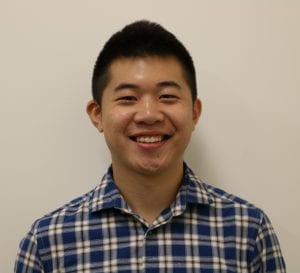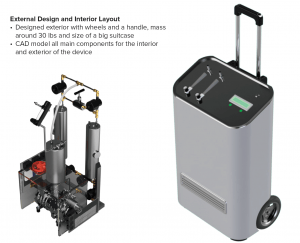Readers!
Besides our incredibly exciting 100andChange news (!!!), we wanted to update you on some of our new staff. We recently welcomed three new eager and talented Global Health Fellows, who work on testing and refining the devices our undergrads design into finished products, like the Pumani CPAP we’re all so proud of today.
So, without further ado, we present our first #FellowsFriday with Jack Wang!
Emily: So, Jack, let’s start off with where you’re from, where you attended school, and what you majored in.
Jack: I’m from Shijiazhuang, China, a town about a 3-hour drive southwest of Beijing. I graduated from Carnegie Mellon University in Pittsburgh, PA, this past May and I studied Mechanical and Biomedical Engineering.
Emily: Two majors! That’s super impressive. How did you learn about Rice 360° all the way up in Pennsylvania?
Jack: Yeah, the Associate Department Head of Biomedical Engineering at CMU shared a flyer about the Rice 360° Fellowship with all the seniors on February 14th (I went back and checked, Valentine’s Day!).
It piqued my interest, so I researched Rice 360°’s website, and contacted Dr. Oden and Megan for more information about the position. I really admired the passion behind Rice 360°’s mission and decided to apply for the Fellowship.
Emily: What sparked your interest in global health to begin with? And, are there specific sub-areas that interest you most?
Jack: The most recent and direct reason for my interest is the senior design project I did at CMU. My team designed an oxygen concentrator for low-resource settings in Nepal.
The course and the project lent me fresh views on the need for technologies in the developing world. I was shocked that a place where people need oxygen treatment the most couldn’t get it; oxygen tanks can’t be transported there and current oxygen concentrators can’t deal with the voltage fluctuations so common in remote areas.
My team built an oxygen concentrator with a cheaper oxygen-sensing technology and an additional voltage stabilizer. We aimed to make the device low-cost, low-maintenance, and capable of handling voltage fluctuations.
I believe technologies like our oxygen concentrator can address real global health issues. I think the key is the translation from a clinical need to an engineering solution. This requires an in-depth study of the socioeconomic conditions of the low-resource setting at hand.
Emily: That sounds like such a cool opportunity. I just started learning about the world of global health myself, and I’m already fascinated by it. If I could go back, I would definitely try out global health as a college student!
What are some goals you’d like to set for yourself going into this Fellowship?
Jack: First, I want to focus on my project — which also happens to involve oxygen concentrators — and bring it as close to the final product as possible. During the process, I want to learn about medical device research and development and the field of neonatal healthcare — a new field to me.
Along the way, I hope I can improve my engineering skills and develop new skills as a researcher. I also want to get to know and learn from all the great people at Rice 360° and Rice in general.
Emily: I definitely think the Fellowship provides you with a crash course on many engineering skills, so you won’t experience any disappointment there.
What has been the most surprising or interesting thing you’ve learned about Rice 360° since starting?
Jack: I’m not sure if I should say this or not, but I was a bit surprised that there are so many female scientists, engineers, and staff at Rice 360°. Also I found it really exciting how dedicated everyone is to their work, how the team seems well-versed on all of their colleagues’ work, and their eagerness to help each other out on the projects.
Emily: Awesome answer! And no, you should definitely say that — Rice 360° prides itself on its team of strong women! And, I love that you picked up on the incredible amount of passion everyone has for what they do — that’s one of my favorite parts about working here.
Now, the questions are going to get harder — what three traits define you or what is your personal philosophy?
Jack: I’m a firm believer in “all dots will connect,” meaning everything I do will mean something eventually, even if I don’t have it figured out from the start. If I decide to do something I tend not to consider too much on its practical value or what I can get in return. The belief allows me to follow my heart, challenge myself to go outside of my comfort zones, and be confident if I find myself on the “road less traveled.”
Emily: I love that philosophy. What about how you define success, either in general or in terms of this Fellowship?
Jack: Doing something I love, contributing to the general good, staying healthy, and being able to continue exploring and learning.
Emily: Now for an easier question — what do you do during your free time?
Jack: I like playing and watching soccer and basketball. I also enjoy hiking, camping and photographing along the way. During my next long vacation, I’d definitely like to go on a road trip. I’ve visited 30 states and 13 national parks in the U.S. in the past 4 years, mostly through road trips.
Emily: I bet it’s been cool to explore a different country from the one you grew up in over the last several years. You’ve seen more of the U.S. than I have!
Now every twenty-something’s favorite question: what are your plans for the future?
Jack (being a great sport with his answer): I’d love to work in the field of research and development of medical devices. I haven’t decided if it would be in academia or in industry but, hopefully, this Fellowship will help me plan my future career.
Emily: As a proud English major, I have to ask you about the best book you’ve ever read..
Jack: Growing up, I loved Jules Verne’s science fiction novels. My favorite was Around the World in Eighty Days. I prefer reading historical fiction or non-fiction books nowadays, though.
I’ve been reading The Coldest War: America and the Korean War by David Halberstam, an American journalist. I’ve really enjoyed it; it’s given me a different perspective and a bigger picture of the Korean War, which I only learned through Chinese history books and media.
Emily: And last, for fun, tell me a fun fact about you.
Jack: I’ve been cutting my own hair for about 4 years now. I do it once every 3-4 weeks. I sometimes trim my friends’ hair, too.
During his Fellowship, Jack will be working on an oxygen concentrator project. If you’re interested in learning more or have questions for him (or are interested in a cheap haircut), shoot him an email at jackwang@rice.edu.
Thanks for reading!
Emily & Jack


